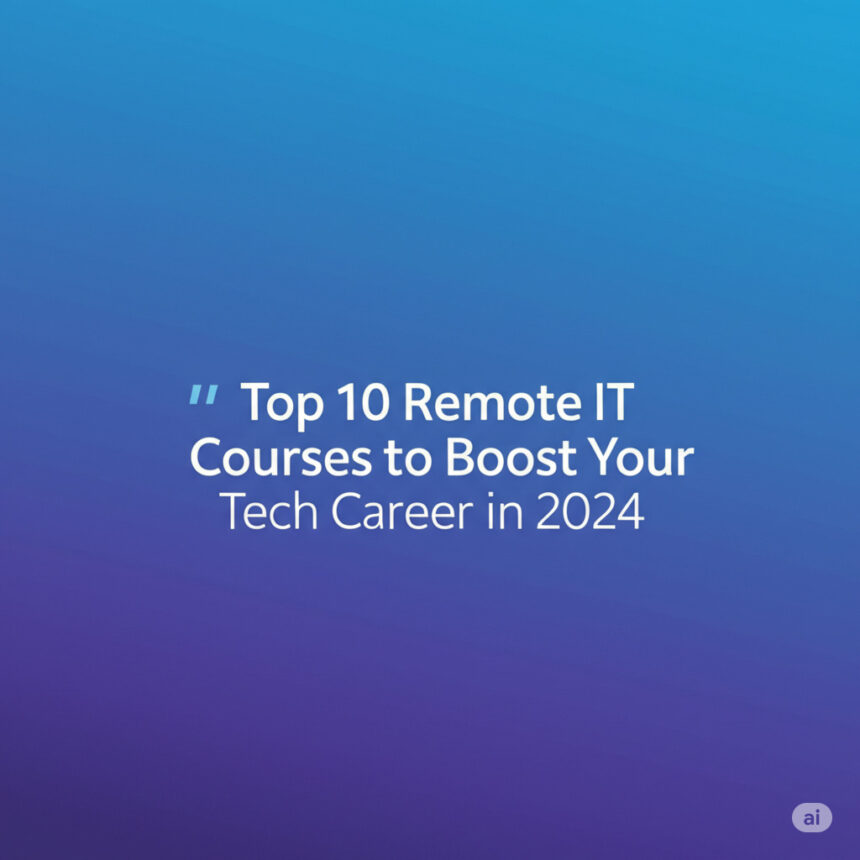My Brain-Numbing, Coffee-Fueled Quest to Find a Tech Course That Wasn’t Garbage
The sandwich was a rock in my stomach. I was in my car. Lunch break. The highlight of my day. I was supposed to be eating, but instead, I was doing that thing I did. That self-destructive, soul-crushing thing.
I was scrolling through job sites on my phone. IT jobs. Systems Administrator. Network Engineer. Cloud Support Specialist. Every title felt like a password to a club I wasn’t in. Every list of requirements was a language I didn’t speak. AWS. CompTIA. Python. Azure.
It was like reading the ingredients on a bottle of shampoo. Just a list of chemicals you’re supposed to trust.
I felt this wave of something cold and heavy wash over me. It wasn’t just boredom with my current job anymore. It was dread. The dread of a future that looked exactly like the present. Beige. So incredibly beige.
I was stuck. And I was sick of being stuck. That afternoon, I went home and my Google search changed. It wasn’t about jobs anymore. It was about a lifeline. “How to get IT skills at home.” That’s what I typed. A desperate plea to the algorithm.
I had no idea I was about to fall into a rabbit hole so deep and confusing, it would take me months to find my way out. This isn’t some neat and tidy list of the top 10 remote IT courses to boost your tech career. This is the real, messy story of that fall. It’s the story of how I went from feeling like a complete impostor to finding a single, wobbly foothold in the world of tech.
My First Clumsy Steps into the Tech Training Minefield
My first few weeks of “research” were a joke. A sad, pathetic joke where I was the punchline.
I thought it would be easy. I thought the internet would just hand me a map. “Start here,” it would say. “Go this way.” Instead, it handed me a tangled ball of Christmas lights. And every light was blinking a different acronym.
It was a nightmare. Every blog post, every YouTube video, was a firehose of jargon. One guy, who looked way too young to be giving life advice, was telling me that certifications were everything. Another, who looked way too slick in his sponsored polo shirt, was saying certifications were a scam and it was all about “projects.” Who was I supposed to believe?
I felt like I was trying to learn a new language, but everyone was shouting at me in that language at the same time. I couldn’t pick out a single word.
The Whole “Course vs. Certification” Thing That Broke My Brain
This was the first wall I ran into. The one that made me feel truly stupid. I kept seeing the words “course” and “certification” used interchangeably. I thought they were the same thing.
They are not. Not even close.
It took me an embarrassingly long time to figure this out. Here’s my clumsy analogy: a course is like taking a weekend cooking class. You go, you learn some stuff, you learn how to chop an onion. It’s educational. A certification is like getting a food handler’s license from the health department. It’s an official, proctored test that proves to the world you know enough not to poison people.
Some cooking classes are designed to help you pass the food handler’s test. Others are just for fun.
Once I got that, a tiny bit of the fog cleared. I realized I didn’t just want to learn; I wanted proof. I wanted that license. That piece of paper. So my search got a little more specific. I started looking for the best online IT certifications for beginners. It felt like a real, tangible goal.
The Time I Tried to Learn Brain Surgery on YouTube
After weeks of spinning my wheels, I got frustrated. I was tired of reading and watching. I wanted to do something.
I saw that cybersecurity was a big deal. It sounded cool. It paid well. I found a course for a very advanced certification with “Ethical Hacker” in the title. I mean, come on. Who doesn’t want to be an ethical hacker?
I thought, “Forget the beginner stuff. I’ll just jump to the end. I’m smart. I’ll figure it out.”
I signed up for the free trial. And I have never felt so profoundly, hopelessly dumb in my entire adult life.
The instructor started talking about buffer overflows and man-in-the-middle attacks. He was moving so fast. I didn’t even understand the questions he was posing, let alone the answers.
It felt like I had walked into the middle of a conversation in a foreign country. I couldn’t even tell where the sentences began and ended.
I lasted maybe twenty minutes. I closed my laptop, put my head in my hands, and just sat there in the quiet of my apartment. The silence was deafening. It was the sound of my own failure. I thought, “This is it. You can’t do this. It’s too hard.”
The Mountain of Terrible Advice I Had to Climb Over
That night was a low point. I almost gave up. I almost resigned myself to my beige cubicle forever.
But the next day, a little spark of anger took over. I was mad. Mad at the gurus, mad at the confusing websites, mad at the whole system that felt designed to keep people like me out. I went back to my research, but this time, I was a cynic. I questioned everything.
And I started to see the myths. The lies. The things people say that sound good but are actually terrible advice.
The “You Need a Degree” Gatekeeping Garbage
This is the big one. The one that stops so many people before they even start. The idea that you need a four-year Computer Science degree to even be allowed in the building.
And it’s the biggest lie of them all. Is a degree helpful? Sure. I’m not denying that. But is it the only way? No. Not anymore.
I started actually reading the job descriptions. And I saw it, over and over again. “Bachelor’s degree in CS or equivalent experience.”
That phrase became my mantra. Or equivalent experience. The game has changed. Companies are slowly, finally realizing that what you can do matters more than the piece of paper you have. Can you solve the problem? That’s the real question. It’s on you to build that experience. It’s a harder road in some ways. It requires a ton of self-discipline. But it is a road. It exists.
The Empty Promise of “Certificate Collecting”
This was the next trap I had to disarm. I had this vision of myself with a whole collection of certifications. I thought I could just slap them on my resume and watch the job offers roll in.
It’s a seductive fantasy. But that’s all it is.
A certification is a key. A key that might get you past the first locked door—the HR person who’s just scanning for keywords.
But once you’re in the room, the key is useless. You have to be able to have a conversation. You have to be able to answer questions without just regurgitating the textbook. You have to show that you didn’t just cram for a multiple-choice test.
I found this great article on CIO that listed a bunch of valuable certifications. But the whole point of the article wasn’t just the list; it was that the value comes from being able to apply the knowledge. You can read it here. The certification is the receipt; the skill is the actual purchase.
The “Pick Your Forever Career” Paralysis Trap
Cloud. Networking. Cybersecurity. Data. The number of paths is dizzying.
There’s this weird pressure to choose your specialization on day one. Like you’re supposed to know, magically, what you want to do for the rest of your life.
It’s an impossible choice. And it’s a trap that leads to doing nothing at all.
You can’t possibly know what you’ll enjoy until you’ve tried it. The goal at the beginning is not to become a specialist. The goal is to get a taste of everything. Learn the basics of how a computer works. Then learn how they talk to each other. Then learn how to keep them safe.
Your first IT job is not your forever home. It’s a bus station. A place to get your bearings, look at the map, and decide which bus you want to take next. Give yourself permission to be a tourist at first.
The Stupidly Simple Idea That Finally Unlocked Everything
I was so lost. I had a notebook full of scribbled notes, a browser full of bookmarks, and a head full of anxiety. I was drowning in information but starving for knowledge.
The breakthrough didn’t come from my computer. It came from my kitchen sink.
The faucet was dripping. Drip. Drip. Drip. It was driving me insane. I knew nothing about plumbing. So I did what any modern human does. I pulled up a YouTube video.
A guy who looked like my dad showed me, step-by-step, how to turn off the water, unscrew a specific part, replace a tiny rubber washer, and put it all back together.
I followed his instructions. I got a little wet. I swore a few times. But the dripping stopped.
I had fixed it.
And as I was drying my hands, it hit me like a lightning bolt.
I didn’t need to become a certified master plumber to fix my sink. I just needed to learn one tiny skill to solve one immediate problem.
I had been treating tech like it was this grand, academic pursuit. It’s not. It’s a trade. You learn how to fix the faucet.
The “Box-Checker” I Used to Be
For weeks, I had been a collector. My goal was to “Get A+ certified.” To “Learn Python.” They were just items on a checklist.
It was like my goal was to “own a set of wrenches.” But owning wrenches is pointless if they just sit in a toolbox rusting. Their only value is in their ability to tighten a bolt or fix a leak.
I was hoarding tools. I couldn’t do anything. I had a theoretical knowledge of plumbing, but my sink was still dripping.
My New Mission: Just Fix One Faucet
My whole approach flipped.
From that moment on, for every hour I spent watching a course, I forced myself to spend an hour doing something. Anything.
When I started learning about networking, I didn’t just watch the videos. I downloaded a free network simulator and actually tried to build a tiny, imaginary office network. It was ugly. It broke a dozen times. But I fixed it.
When I was learning about cloud computing certifications, I didn’t just memorize the marketing speak for the AWS services. I signed up for their free tier. I followed a tutorial step-by-step until I had a real, live, working virtual server that I had built myself. For free.
My new goal wasn’t to pass a test. It was to build a collection of fixed faucets. A small portfolio of things I had actually, tangibly done.
This shift from passive watching to active doing was the entire game. It’s what I talk about in my post, “My Journey from ‘Not a Tech Person’ to My First IT Gig.”
The Actual Stuff That Helped Me (and Didn’t Make Me Feel Dumb)
So, after all that trial and error, what did I actually end up using? This isn’t some “top ten” list. This is just my path. The things that worked for a normal guy who was starting from absolute zero.
I think of it as a journey. You start at the beginning. No skipping chapters.
The Starting Line: “What the Heck Is a Computer?”
You have to start here. I’m serious. Don’t let your ego tell you you’re too smart for the basics.
The Google IT Support Professional Certificate on Coursera was my savior. It’s designed for people who know nothing. It patiently, kindly explains what a CPU is, what an operating system does, what a network is. It gave me the vocabulary. It gave me a map of the world. If you do nothing else, I beg you, start with this. You can find it right here.
The First Piece of Paper: “Okay, I Can Prove It Now.”
The Google course is for you. It’s for your brain. But the CompTIA A+ certification is for them. It’s for your resume. It’s the industry-standard piece of paper that says, “This person can be trusted not to set the building on fire.” It’s the key to getting your first entry-level, “I’ll answer the phone and reset passwords” kind of job. The Google course is the perfect study guide for this.
The Next Steps: “Hmm, This Part Is Kind of Interesting.”
Once you have that foundation, you can start to explore.
I found networking surprisingly interesting. So, I moved on to the CompTIA Network+. It was like going from learning the alphabet to learning how to form sentences.
Then, because it felt like the responsible thing to do, I tackled the CompTIA Security+. This is the one that teaches you about all the scary things in the world and how to build digital walls to protect against them.
For me, the cloud was the thing that really sparked my curiosity. That feeling of being able to create a powerful server with just a few clicks of a mouse felt like magic. I started with the AWS Certified Cloud Practitioner, which is just the beginner’s vocabulary test. Then I moved on to the AWS Solutions Architect – Associate, which is where you actually learn to build the magic castles in the cloud.
And all the while, I was building stuff. Tiny, stupid things. I was following tutorials to build a small Python script to automate a boring task. I was setting up a virtual home network. This became my tech portfolio. An article from FreeCodeCamp called “How to Build a Web Developer Portfolio” gave me the courage to do this, even with my non-developer projects. I talk about my own messy attempts in my post, “How I Built My First Tech Portfolio (and What I’d Do Differently).”
So, Am I a Tech Genius Now? (Spoiler: Not By a Long Shot.)
The guy who was having a panic attack in his car on his lunch break? He’s still in here. I still feel that wave of impostor syndrome all the time.
I am not a tech expert. I never will be. The field is too big, and it changes too fast.
But I’m not scared of it anymore.
I realized this whole journey wasn’t about finding the perfect course or the perfect certification. It was about finding the confidence in myself to learn something hard. It was about proving to myself that “not a tech person” was just a story I had been telling myself. A lazy, comfortable lie.
If you’re where I was, staring at that wall of acronyms and feeling like it’s impossible, it’s not. It’s just a bunch of faucets that need fixing. You just have to be willing to pick up the wrench and get your hands a little wet.
You just have to be willing to start.
So, what’s your faucet? What’s the one thing in all this mess that seems even a little bit interesting to you? What’s the one small, tiny step you could take this week?


































